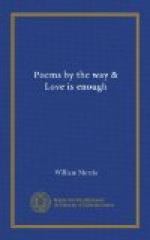The days have slain the days, and the seasons have gone by And brought me the summer again; and here on the grass I lie As erst I lay and was glad ere I meddled with right and with wrong. Wide lies the mead as of old, and the river is creeping along By the side of the elm-clad bank that turns its weedy stream; And grey o’er its hither lip the quivering rashes gleam. There is work in the mead as of old; they are eager at winning the hay, While every sun sets bright and begets a fairer day. The forks shine white in the sun round the yellow red-wheeled wain, Where the mountain of hay grows fast; and now from out of the lane Comes the ox-team drawing another, comes the bailiff and the beer, And thump, thump, goes the farmer’s nag o’er the narrow bridge of the weir. High up and light are the clouds, and though the swallows flit So high o’er the sunlit earth, they are well a part of it, And so, though high over them, are the wings of the wandering herne; In measureless depths above him doth the fair sky quiver and burn; The dear sun floods the land as the morning falls toward noon, And a little wind is awake in the best of the latter June. They are busy winning the hay, and the life and the picture they make If I were as once I was, I should deem it made for my sake; For here if one need not work is a place for happy rest, While one’s thought wends over the world north, south, and east and west.
There are the men and the maids, and the wives and the gaffers grey Of the fields I know so well, and but little changed are they Since I was a lad amongst them; and yet how great is the change! Strange are they grown unto me; yea I to myself am strange. Their talk and their laughter mingling with the music of the meads Has now no meaning to me to help or to hinder my needs, So far from them have I drifted. And yet amidst of them goes A part of myself, my boy, and of pleasure and pain he knows, And deems it something strange, when he is other than glad. Lo now! the woman that stoops and kisses the face of the lad, And puts a rake in his hand and laughs in his laughing face. Whose is the voice that laughs in the old familiar place? Whose should it be but my love’s, if my love were yet on the earth? Could she refrain from the fields where my joy and her joy had birth, When I was there and her child, on the grass that knew her feet ’Mid the flowers that led her on when the summer eve was sweet?
No, no, it is she no longer; never again can she come And behold the hay-wains creeping o’er the meadows of her home; No more can she kiss her son or put the rake in his hand That she handled a while agone in the midst of the haymaking band. Her laughter is gone and her life; there is no such thing on the earth, No share for me then in the stir, no share in the hurry and mirth. Nay, let me look and believe that all these will vanish away, At least when the night has fallen, and that she will be there ’mid the hay, Happy and weary with




